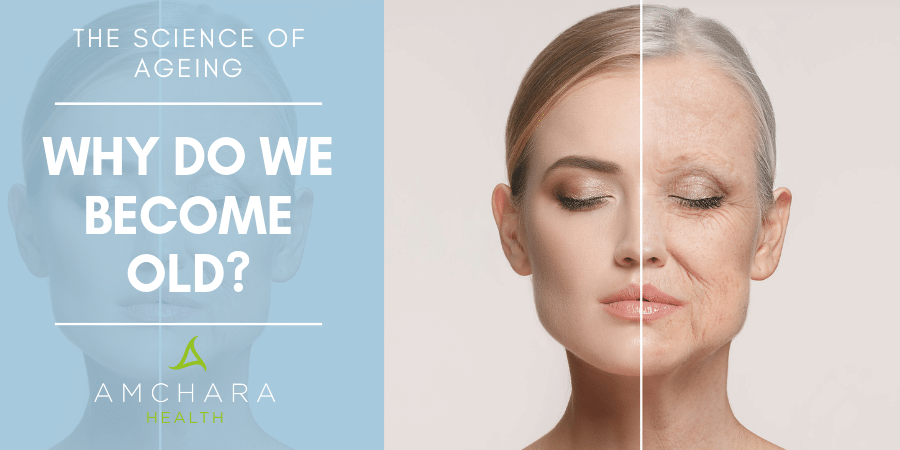Topics Covered in this article:
Ageing. We can’t avoid it, much as we’d like to.
But do you know why we age?
And if we are able to answer that question, is there anything we could do to slow or stop the process, or even to reverse it?
We always take an evidence-based approach, providing you with actionable tips to help you on your journey to optimal health and in this article we’ll look at what happens to our bodies’ cells as we age, as well as factors which can speed up and slow down this process.
We Are All Getting Older
Like it or not, every day our cells get older.
It’s said age brings wisdom, but it also typically brings about decline, slowing down, wrinkles, stiffness and chronic disease, which are often the manifestations of ageing body cells.
The UK population is getting older – according to the Office for National Statistics, 18% of the population were aged over 65 in 2016 and by 2030 it’s projected to be 24%.
The Ageing Process
Ageing – the process of becoming older – brings with it progressive cell damage over time.
The experience of ageing and how quickly it proceeds is different for all of us, and the processes by which your body’s cells age are affected by a complex set of genetic and environmental factors.
- Senescence – Worn Out Cells
As you age, more and more of your cells become what’s known as senescent – in other words, deteriorating and worn out.
Senescent cells cannot reproduce.
Their development is the body’s defence mechanism preventing damaged cells from multiplying.
Otherwise damage to these cells’ DNA could mean they become cancerous.
Effectively, senescent cells are still alive, but they’ve checked out of participating in the functioning of the body.
They’re often known as zombie cells.
Senescent cells release inflammatory chemicals which can harm healthy cells and even create more senescent cells.
In one study, researchers implanted senescent cells into young animals, who then became frail, as though they were old.
It’s thought the reason for this is inflammation released by the senescent cells may have turned other previously young and healthy cells into ageing ones (1).
This widespread inflammation which is found throughout the body as you age is called ‘inflammaging’.
- The Immune System and Ageing
Ordinarily, your immune system would detect damaged and zombie cells and clear them from the body before they can do any damage.
However, as we start to get old, senescent cells become numerous and the inflammatory molecules they secrete become plentiful.
These two factors affect immune system function so it’s no longer able to clear away senescent cells.
Added to this, senescent cells appear to develop a resistance to dying and are able to survive in even very inflammatory environments
Your Telomeres and Ageing
A major reason cells become senescent is reduced telomere length.
Telomeres are protective caps sitting on the end of each strand of DNA in the nuclei of your cells.
They protect your chromosomes, which are thread-like structures containing your genetic material.
They’ve been likened to the little plastic or metal ends on shoelaces which prevent them unravelling.
Telomeres are vital because they protect the information in your genome.
When a cell divides, the chromosomes are replicated and each daughter cell should inherit an identical pair of chromosomes.
However, the enzymes which are needed for this process struggle with replicating both strands of chromosomes at once, because they run in opposing directions.
The result of this is the very end of the chromosome can’t be replicated, leading to a progressive shortening of the telomere each time the cell divides.
If telomeres shorten too much they are unable to continue protecting your chromosomes.
The result is damage to DNA, increased susceptibility to ageing and disease and, not surprisingly, a shorter lifespan.
Once the telomeres in any given cell reach a certain length, the cell becomes senescent – then it cannot divide any further and will eventually die.
Telomere shortening is something which happens naturally to all of us.
Telomeres halve their length by the time we reach adulthood and will further reduce in length by another 50% by the time we reach old age.
Telomere length is considered to be a marker of how biologically old we are, as opposed to our chronological age.
Scientists don’t know for sure whether telomere length is an indication of biological ageing or one of the causes.
Telomere Length and Illness
The shorter our telomeres, the more likely we are to suffer from chronic disease.
Scientists examined the length of the telomeres in the white blood cells of men who had suffered a heart attack younger than age 50.
They found the telomeres of these men were of a similar length to those expected in people over 11 years older (2).
People with shorter telomeres have been found to be eight and a half times more likely to die from an infectious disease (3).
Short telomere length in the white blood cells of the immune system, which need to divide quickly to fight infection, may mean they can no longer react quickly enough, increasing the risk of dying from the infection.
Factors Which Reduce Telomere Length
Telomeres and therefore our rate of ageing may shorten at different rates due to genetic and lifestyle factors.
- Smoking
Smoking reduces telomere length. In fact, the amount of cigarettes smoked is directly correlated with the length of cell telomeres (4).
- Obesity
In obese women, researchers found telomeres were significantly shorter than in lean women of the same age.
This was calculated to be equivalent to a loss of almost nine years of life, so obesity seems to have an even greater effect than does smoking (5).
- Stress and Trauma
One study showed children who had lost their fathers through bereavement or the divorce of their parents had shorter telomeres (6).
Other research has found stress can accelerate telomere shortening.
- Pollution
Telomeres of office workers were found to be longer than those of police officers who were exposed to air pollution from traffic (7).
Another study found the length of time a person had been exposed to pollution correlated with the length of their telomeres.
- Oxidative Stress
Oxidative stress is believed to be a major factor in ageing as it is able to cause damage to DNA and therefore may cause faster telomere shortening.
Oxidative stress can be neutralised by antioxidants, but problems occur when the body doesn’t have sufficient antioxidant reserves (8).
Can You Prevent Telomere Shortening?
- Calorie Restriction
The theory goes if food is restricted, the body goes into a form of survival mode.
In studies, food restriction consistently leads to extended lifespan.
Less food means less oxidative stress and so reduced damage to DNA.
In animals food restriction has been seen to extend lifespan and increase telomere length (9).
Intermittent fasting, in other words restricting food intake for a specific time period, has been found to reduce the number of senescent cells by a process called autophagy, where dysfunctional parts of worn out cells are removed or recycled.
- Diet
Researchers discovered telomere length positively correlated with increased intake of dietary fibre (10).
The authors of this study also found an inverse relationship between the amount of omega-6 fatty acids and telomere length.
Although omega-6 fats are essential to our health, it’s common to consume them in far greater amounts than the other essential fatty acid, omega-3.
Imbalances of these two fatty acids have been linked to health issues, including increased inflammation.
Indeed, blood levels of omega-3 fats have been found to be linked to longer telomeres and therefore protect against cell ageing (11).
A further study on over 4500 middle-aged women suggested eating a Mediterranean diet high in vegetables and olive oil may mean longer telomeres.
The more the women kept to the eating plan, the longer their telomeres (12).
- Exercise
It’s well known regular exercise is associated with better health, but it appears it’s also associated with longevity.
One study found the telomeres in white blood cells of human volunteers were significantly longer in those who participated in the most exercise in their leisure time, compared to those who took the least exercise (13).
The duration of exercise undertaken by a person, as well as less time spent sitting, has been seen to inversely correlate with damage to the DNA of their cells.
- Stress Management
There is also evidence to show telomeres can regrow if people change to a healthier lifestyle, including stress management techniques.
One study looked at men in their early sixties who switched to plant-based eating and incorporated half an hour’s walking into their day along with an hour per day of yoga and meditation.
After five years on this regime, their telomeres had lengthened by an average of 10%.
In other words, the men became biologically younger.
Even more impressively, the healthier the regime, the longer their telomeres.
A similar group of men who maintained their previous food choices and lifestyle habits had telomeres 3% shorter than before over the same period of time (14).
Anti-Ageing Elixirs
The obvious question from all this is: can we encourage telomere lengthening or remove senescent cells from the body?
If so, could ageing potentially be slowed down?
Lately this very question has been the subject of considerable and costly research.
There is potentially a huge amount of money to be made if anti-ageing drugs could be developed that actually worked.
This scenario could be closer than you may think, as scientists race to formulate ‘the fountain of youth’.
- Increasing Telomere Length
Researchers have already isolated a component of telomerase, the enzyme which maintains telomere length, and successfully extended the length of telomeres in the laboratory by 10% in just a few days.
- Eradicating Worn Out Cells
Another potential way of retarding ageism could be to eliminate zombie cells by selectively triggering their death.
Scientists have developed a drug which they used in combination with the antioxidant quercetin (a plant pigment (flavonoid) found in many plants such as onions, apples, berries and green tea).
Together, the drug and quercetin were capable of disabling the mechanism which protects senescent cells from inflammation.
The combination increased lifespan and decreased inflammation levels in mice, even when taken in old age (15).
One advantage of such drugs would be they would only need to be taken occasionally to clear accumulations of senescent cells.
Other drugs have been designed to reduce the inflammation secreted by senescent cells, but these come with side effects and they would need to be taken on an ongoing basis.
One compound, based on resveratrol, an antioxidant found in red wine, is currently being investigated for its capability of encouraging zombie cells to revert to younger cells and start dividing again.
Even more promisingly, a combination of quercetin and vitamin E has been found in a test tube to encourage senescent cells to die (16).
But it’s hard to evaluate the effect of anti-ageing drugs, as in humans at least, this would take many years.
Conclusion
The science of ageing, although fascinating, returns again and again to broadly similar conclusions – what makes us old is not fixed by our genes but can be affected by our lifestyle and nutrtion choices.
If you would like to explore how to naturally optimise your health as you grow older, a consultation with an Amchara Health Practitioner can help guide you on your personalised health journey.
Did you find this article interesting?
What are your anti-ageing tips?
Please share your thoughts in the comments.
READ THIS NEXT:




